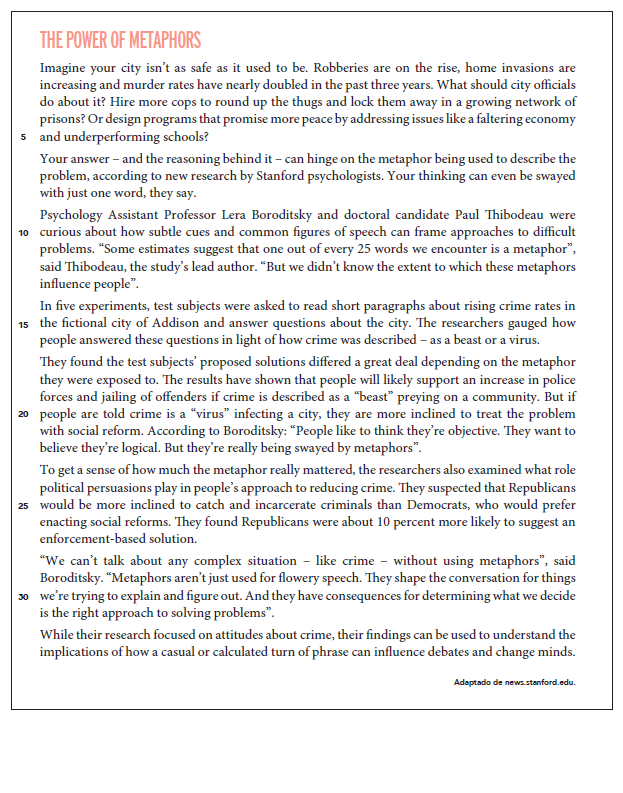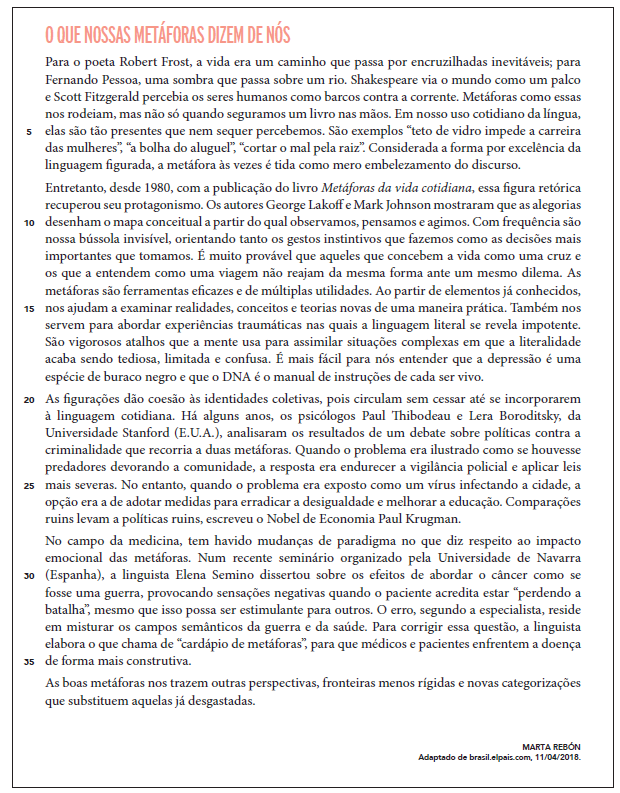Questões de Vestibular Sobre inglês
Foram encontradas 5.992 questões
The power of metaphors discusses the use of metaphors in daily life, as well as the text O que nossas metáforas dizem de nós.
The following metaphor is present in both texts:
Consider the following sentence.
It is only when some irrelevant memory makes us prejudiced that we should search our mind for the reason for the aversion.
Select the alternative with the proposition that best rephrases it.
Consider the following propositions for rephrasing the sentence All of us, when we see a painting, are bound to be reminded of a hundred-and-one things which influence our likes and dislikes (l. 24-27).
I - When we see a painting, all of us are bound to be reminded of a hundred-and-one things which influence our likes and dislikes.
II - All of us are bound to be reminded of a hundred-and-one things which influence our likes and dislikes when we see a painting.
III- A hundred-and-one things which influence our likes and dislikes are bound to be reminded by all of us when we see a painting.
If applied to the text, which ones would be correct and keep the literal meaning?
Consider the following statements.
I - The pronoun Its (l. 15) refers to what he has just done (l. 14).
II - The pronoun It (l. 23) refers to Someone (l. 21).
III- The pronoun It (l. 29) refers to when some irrelevant memory makes us prejudiced (l. 29-30).
Which ones are correct?
Mark the statements below with T (true) or F (false), according to the text.
( ) The indefinition of what Art is allows different interpretations of what is beautiful or not.
( ) The author believes that liking an artwork needs no justification, but disliking it does.
( ) Representations of beautiful things are easily perceived as good art.
( ) An artist can make a great picture out of a repugnant subject-matter.
The correct sequence of filling in the parentheses, from top to bottom, is
Considere as possibilidades de reescrita do segmento The new division between best picture and popular picture may be Ill-judged, but it reflects a pre-existing dichotomy between arthouse and multiplex fare (l. 63-66).
I - Ill-judged as the new division between best picture and popular picture may be, it reflects a pre-existing dichotomy between arthouse and multiplex fare.
II - Despite the fact that the new division between best picture and popular picture may be ill-judged, it reflects a pre-existing dichotomy between arthouse and multiplex fare.
III- Despite the possibility of being ill-judged, the new division between best picture and popular picture reflects a pre-existing dichotomy between arthouse and multiplex fare.
Quais poderiam substituir o segmento, sem prejuízo do sentido original e da correção gramatical?
Associe as palavras da coluna da esquerda às suas respectivas traduções, na coluna da direita, de acordo com o sentido com que estão empregadas no texto.
( ) shoot-out (l. 15)
( ) chasm (l. 55)
( ) low -key (l. 60)
1. de baixo custo
2. abismo
3. tiroteio
4. discreto
5. conexão
6. explosão
A sequência correta de preenchimento dos
parênteses, de cima para baixo, é
Considere os seguintes trechos extraídos do texto.
I - The idea is that, alongside the time-honoured “Best Picture” category, there will be another for films (l. 04-07).
II - It is understandable that the Oscar´s organisers should want to shake up the cerimony´s format (l. 38-40).
III- (…) best-picture winners are no longer the films that the great American public is queuing up to see (l. 42-45).
Em quais a palavra that pode ser tanto omitida quanto substituída por which?
Considere as afirmações abaixo.
I - O texto faz uma crítica contundente à Academia de Artes e Ciências Cinematográficas pela criação de uma categoria de premiação para filmes populares no Oscar.
II - O autor considera o “Oscar Pipoca” problemático, porque, entre outras razões, não há critérios claros para se caracterizar um filme como popular.
III- O texto afirma que a nova categoria visa aumentar a audiência da cerimônia do Oscar, a qual vinha caindo em função de a Academia não privilegiar filmes pelos quais o público faz filas.
Quais estão corretas, de acordo com o texto?
Assinale com V (verdadeiro) ou F (falso) as afirmações abaixo, acerca da estrutura do texto.
( ) A palavra But (l. 10) poderia ser substituída por However, seguida por vírgula, sem prejuízo da correção gramatical e do significado original do texto.
( ) O trecho the Nigeria he returned to (l. 10) poderia ser susbstituído por the Nigeria to which he returned, sem prejuízo da correção gramatical e do significado original do texto.
( ) A palavra Besides (l. 32) poderia ser substituída por Notwithstanding, sem prejuízo da correção gramatical e do significado original do texto.
( ) O trecho a pleasure car stops for you (l. 42-43) poderia ser substituído por a pleasure car will stop for you, sem prejuízo da correção gramatical e do significado original do texto.
A sequência correta de preenchimento dos parênteses, de cima para baixo, é
Considere as seguintes afirmações acerca do texto.
I - O segmento took on (l. 06) poderia ser substituído por assumed.
II - A expressão ne’er-do-wells (l. 23) confere um sentido enaltecedor aos soldados.
III- A palavra wonderment (l. 44) enfatiza a dúvida por parte das pessoas que ouviam o soldado.
Quais estão corretas?




